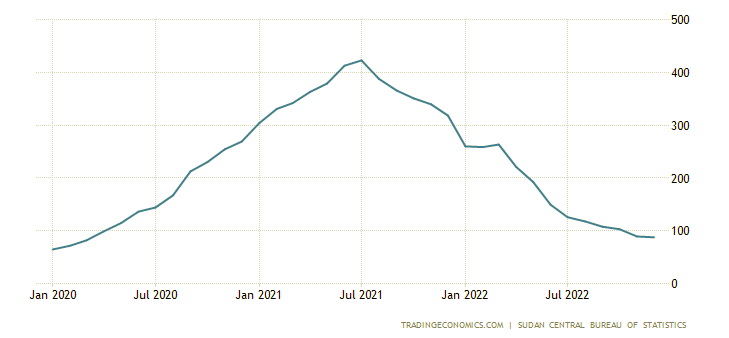Sudan inflation rate drops to 87.32% as Khartoum water tariffs rise

Inflation rates in Sudan from January 2021 to December 2022 (CBS / Trading Economics)
KHARTOUM –
Policies of the Ministry of Finance will only worsen the situation as inflation rates continue to drop in Sudan, Economist Haisam Fathy told Radio Dabanga. The Khartoum state Water Corporation has announced plans to increase tariffs on drinking water.
Sudan’s Central Bureau of Statistics (CBS) reported a decrease in the annual inflation rate in December to 87.32 per cent. Inflation rates were 88.83 per cent in November and 102.61 per cent in October. Sudan’s headline inflation rate averaged 359.09 per cent in 2021, up from 163.26 per cent in 2020.
Fathy noted the impact of the global inflation wave on Sudan, which especially inflated prices of oil, gas, and agricultural materials. “The Sudanese economy suffers from a complex crisis represented by slow economic growth, accompanied by a rise in inflation rates, a fast-growing budget deficit, and a decline in foreign currency reserves,” he explained.
He warned that raising taxes and imposing new taxes, as the Ministry of Finance was doing last year, “will lead to a decline in national income and increase the deflation gap, which in turn leads to a decline in economic activity, an increase in unemployment rates, and a decline in production”.
Last month, FEWS NET reported that cereal prices remain 150-200 per cent higher than in December 2021 and over five to six times higher than the five-year average, driven by high production and transportation costs and the depreciation of the Sudanese Pound.
Harvests of rainy season crops have improved food availability, but generally high prices continue to reduce purchasing power, according to the report.
“A budget deficit prevents efficient and effective use of government spending, which requires the government to resort to reducing tax rates on the productive sectors.”
Mohamed Ali El Ajab, Director general of the Water Corporation, said in a press statement on Tuesday that drinking water tariffs will increase in Khartoum. “The current water tariff does not cover all operating expenses represented in the purification of water, maintenance of equipment, or the cost of pump stations at the Nile and subterranean basins,” said El Ajab.
Sudan must protect the purchasing power of ordinary Sudanese people, said Fathy, calling for an increase in the local supply of basic commodities in order to reduce inflation. Inflation should be combated through policies within an economic framework, he said.
Professor Esam Abdelwahab Bob explained to Sudan Tribune in October that he doesn’t have faith in inflation figures because “they aren’t grounded in authentic statistical surveys and given the stormy political climate they may not be true.”
Inflation was traditionally known to be the diminishing ability of a unit of currency to buy goods and services, but it could occur while the economy is still growing. However, these days there is increasing talk of ‘stagflation’, which is inflation coupled with low growth rates, high unemployment, depressed wages, and a growing deficit in the balance of payments.
Economic analyst Kamal Karrar said that the 2023 budget, which has not yet been approved, includes a significant increase in military and security spending and a significant decrease in the budgets for education, health, development, and services. In an interview with Radio Dabanga last week, he predicted that the new budget “will most probably lead to the collapse of the country.”











 and then
and then